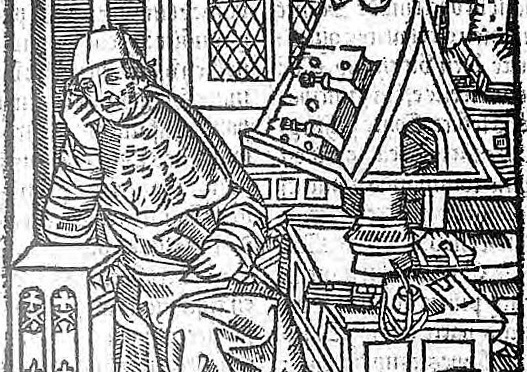The first duty of a historian is to produce works of art. By this I do not primarily mean works that are finely written, but works that are emotionally and intellectually satisfying, that combine a clear unity of conception with a vivacity of detail, and portray people whose actions are intelligible within the framework of their circumstances and character. It is thus that one might describe as the aims of a Balzac or a Tolstoy: I say therefore that a historian should aim at satisfying the same emotional and intellectual needs as a novelist or poet. How he is to do this within the limits of the available data is the great question.
R.W. Southern, ‘Aspects of the European Tradition of History Writing’
Quotes
Take a foreign language, write it in an unfamiliar script, abbreviating every third word, and you have the compound puzzle that is the medieval Latin manuscript.
Preface to English translation of A. Cappelli’s The Elements of
Abbreviation in Medieval Latin Paleography (1982)
Contingencies in History
Le nez de Cléopâtre, s’il eût été plus court, toute la face de la terre aurait changé.
Blaise Pascal, Pensées
How Medievalists are Born
[As a child] I assumed that medieval people all believed what popes told them to believe, or got burned as heretics. Some historical misconceptions are 100 per cent fantasy. Other have an infinitesimal grain of truth and blow it out of proportion. My own view of the Middle Ages hovered between these categories.
Then doubts began. Putting the medieval church in a black bin bag to throw it away could do it no harm. The people concerned were long dead and out of harm’s way. But we might do harm to ourselves, I reflected, if misconceptions about the past were to distort our views of own places in the world, and where it was going.
So I encouraged the doubts.
– Alexander Murray, introduction to Conscience & Authority in the Medieval Church
History & Physics
According to modern physics, nothing is as solid as it seems. Things that seem so turn out to be tiny points of energy, in precarious equilibrium, giving our rough senses only an impression of solidity … This truth in physics holds also in the fields of politics, law, and economics. There are plenty of things that seems solid enough, like ancient empires or modern armies or (in the economic field) money. But on careful inspection these, too, turn out to be points of energy, in temporary equilibrium, in the beliefs and feelings of individuals. When these change, the seeming solid dissolves into its constituent points, which then reassemble in new forms—with an equally deceptive appearance of corporeality.
– Alexander Murray, ‘Excommunication & Conscience in the Middle Ages’
The Fickleness of Time
Time is fickle to historians. They spend their lives trying to rescue other people’s achievements from oblivion, only to see their own vanish into it with humiliating speed.
– Alexander Murray
The Rise of Fiction
This figure of the author-writer came into existence in the years around 1170 after a gestation that had lasted several decades… It was the scholarly writer who groped his way toward fiction, not the oral storyteller who simply resorted to writing.
Per Nykrog, ‘The Rise of Literary Fiction’
Chivalry & Learning
Our books have informed us that the pre-eminence in chivalry and learning once belonged to Greece. Then chivalry passed to Rome, together with that highest learning which now has come to France. God grant that it may be cherished here, that the honour which has taken refuge with us may never depart from France. God had awarded it as another’s share, but of Greeks and Romans no more is heard; their fame is passed, and their glowing ash is dead.
Chrétien de Troyes, c. 1170
A Historian’s Responsibilities
I am instinctively wary of formulaic approaches that risk imposing patterns on—and hence, in my judgement, doing violence to—the sources . . . [This does not] mean that I accept uncritically whatever our sources tell us. While no disciple of Postmodernism, I have tried to stand outside the source material and to remember that historians can never hope to retrieve ‘what actually happened’—though that does not, in my view, absolve them of the responsibility of trying to get as close as possible to it.
Peter Jackson, Introduction to The Mongols and the West, 1221-1410
Writing History
Writing history is like W C Fields juggling. It looks easy until you try it.
A. J. P. Taylor
Lessons of History
Why does history matter? It is sometimes suggested that we should study history to learn lessons for the present. This strikes me as problematic. If we mean by this that history (or History) presents us with lessons to be learnt, I have yet to see any example of anyone paying attention in class.
John H. Arnold, History: A Very Short Introduction
The Poetry of History
History has its peculiar aesthetic pleasures. The spectacle of human activity which forms its particular object is, more than any other, designed to seduce the imagination – above all when, thanks to its remoteness in time or space, it is adorned with the subtle enchantment of the unfamiliar . . .
Let us guard against stripping our science of its share of poetry. Let us also beware of the inclination, which I have detected in some, to be ashamed of this poetic quality. It would be sheer folly to suppose that history, because it appeals strongly to the emotions, is less capable of satisfying the intellect.
Marc Bloch, The Historian’s Craft
